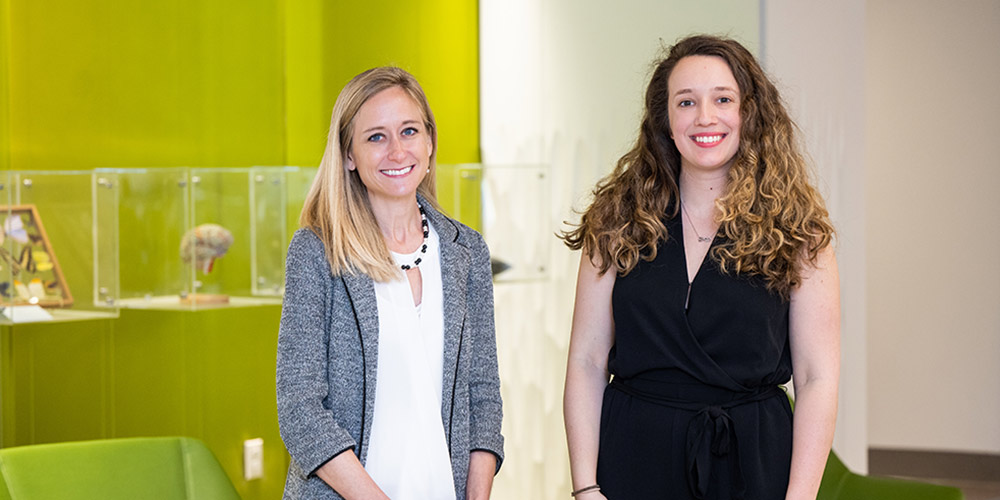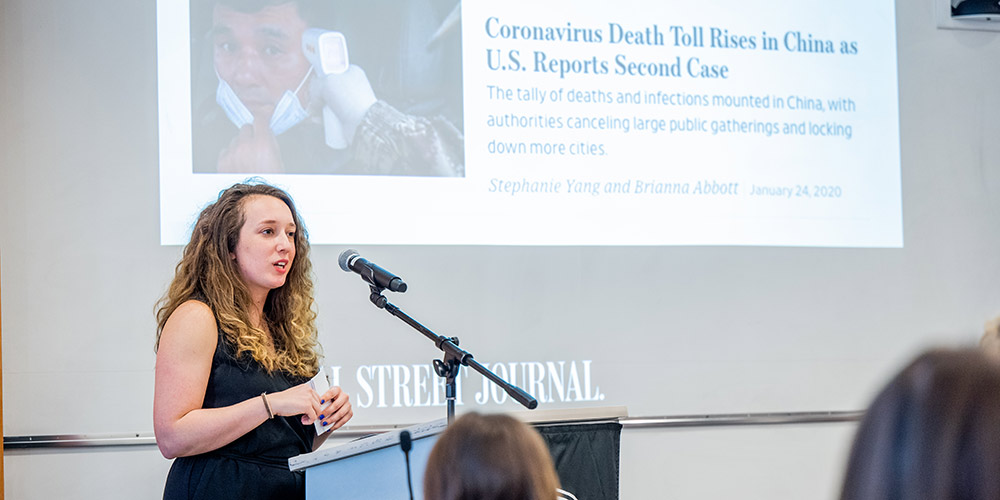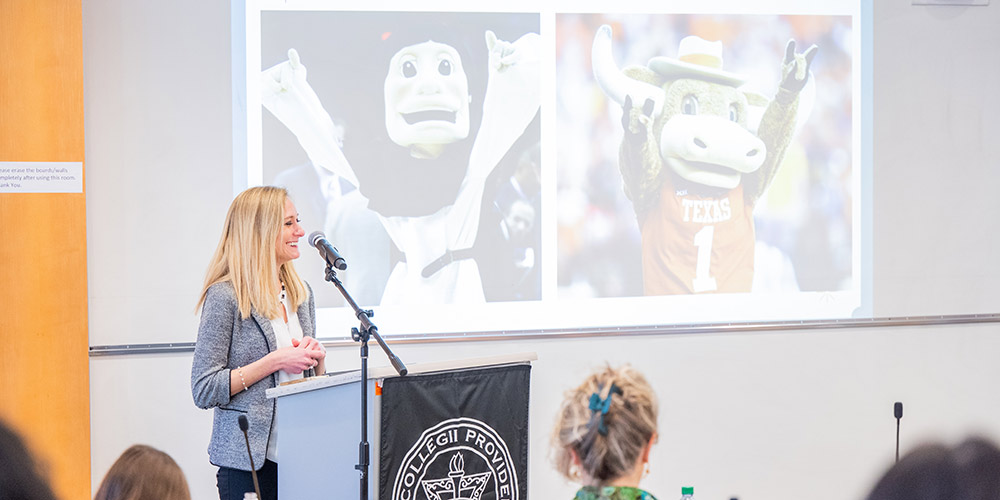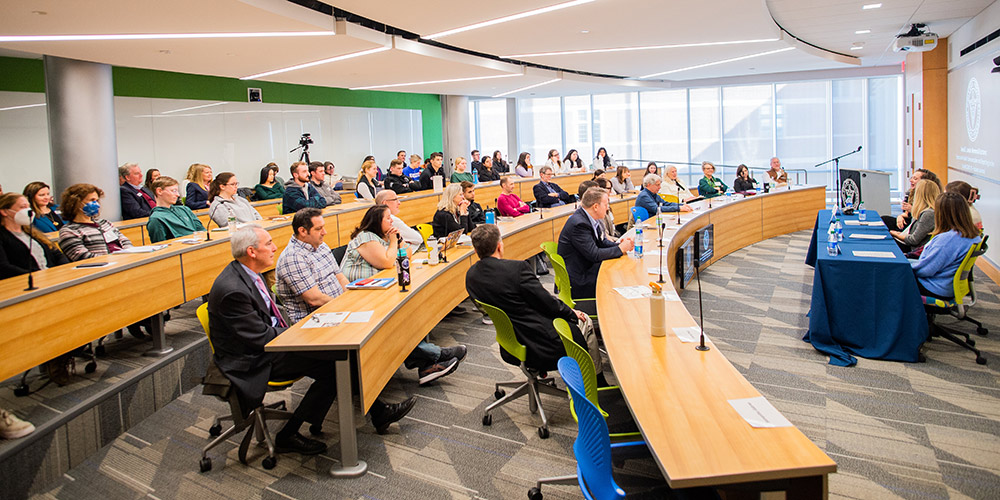Lavoie Lecture addresses health journalism in the era of COVID-19
By Michael Hagan ’15, ’19G
Two graduates who work in the field of health and science communications described the challenges of reporting news in the COVID-19 era during a presentation to Providence College students, faculty, and community members.
Brianna Abbott ’17, a health reporter for the Wall Street Journal, and Mallary Tenore ’07, a professor of journalism at Moody College of Communication at the University of Texas at Austin, were keynote speakers at the fifth annual Anna E. Lavoie Memorial Lecture, held in the Science Complex on March 20, 2023.
The lecture was established by Teresa Lavoie, J.D., Ph.D. ’89 in memory of her late mother to encourage students to consider an array of career paths in the sciences by interacting with distinguished scientists and other professionals.

Abbott, who majored in both chemistry and creative writing at PC, also has holds a master’s degree in science, health, and environmental reporting from New York University. She has worked for The Wall Street Journal since 2019.
“I loved my creative writing program,” Abbott said. “You encounter many journalists who are great reporters but struggle when it comes to putting the narrative together. I realized I had a leg up because I had a degree in science, but also in creative writing.”
Abbott recalled returning to The Wall Street Journal offices after working remotely at the height of the pandemic.
“We returned to dust and yellowing stacks of newspapers. At the top of a stack of papers was an article I had written about how the coronavirus outbreak had just been declared a public health emergency,” she said.
The article, last updated online on January 30, 2020, described responses to the World Health Organization’s emergency declaration by governments and businesses in countries including the China, France, India, Japan, Russia, and the United States, as well as early reports on the transmissibility of the virus and the severity of the disease it causes.

“It’s vitally important to explain science in a way that people can understand,” Abbott said.
Sometimes this meant compromising on word choice, like when Abbott and her colleagues settled on the term “chemical agent” to describe the defective reactant in early COVID-19 tests that were found to be ineffective.
“As a chemistry person, that term felt weird. But as a journalist, I knew that it would most effectively convey what we meant in explaining the problem with the tests,” Abbott said.
In March 2020, Abbott found herself at her family’s home, doing professional journalism on the floor of her childhood bedroom and hiding stuffed animals and trinkets from the camera for video calls.
Later, she was confined to a small New York City apartment with three other journalists. They would break in the evening for yoga sessions and other leisure activities before checking their phones again.
“The pace of information was incessant,” Abbott said. “Things got better as vaccines arrived, but the virus was also changing, and we’d have to ask every question all over again with each variant of concern.”
For Abbott, scientific literacy and credentials earned trust from scientists and medical experts whom she relied on as sources.
“My background knowledge gave my sources confidence that I would get the science right, which was very important to them. It gave me access and credibility,” she said.

At the University of Texas, Mallary Tenore also is associate director of the Knight Center for Journalism in the Americas. She was previously executive director of the media nonprofit, Images & Voices of Hope, and managing editor at The Poynter Institute, a leading think tank in the field of journalism.
She majored in both English and Spanish at PC and also holds a master of fine arts degree in nonfiction writing from Goucher College in Baltimore. She is the author of the forthcoming book, Slip: Recovery, Sickness, and the Space in Between, an examination of the under-discussed complexities of eating disorders and recovery.
“It’s about my experiences suffering from anorexia and the ongoingness of recovery,” Tenore said. “It’s important because there was a significant increase in instances of and hospitalizations for eating disorders during the pandemic.”
Tenore practices what she describes as “restorative storytelling,” which is more solution-focused than the catastrophizing journalism focused on problems alone that often dominates news outlets.
“It’s an approach that homes in on resilience instead of tragedy alone,” she said.
Throughout the pandemic, Tenore has been a leader in health reporting and communications through her work in Austin. The Knight Center offered massive open online classroom (MOOC) courses and webinars, ranging in length from 90 minutes to three hours, with subject experts “who could really help journalists understand the impact of the pandemic.” This educational content has been translated into 13 languages.
Lenore and her colleagues saw the need for a repository for these session recordings, along with other resources for journalists covering COVID-19, so they built the Knight Center’s COVID-19 hub, which they continue to update.

Before the presentations, guests were welcomed by Joan Branham, Ph.D., professor of art and art history and interim dean of the School of Arts and Sciences, and Ann Manchester-Molak ’75, PC’s executive vice president.
Andrea McDonnell, Ph.D., associate professor of political science and director of the communication program, explained the college’s new communication minor, encouraging students from all disciplines, including the sciences, to consider it.
“A minor in communication complements your major interests, including those in the health sciences and those interested in reporting and broadcasting,” McDonell said.
After speaking, Abbott and Tenore responded to questions presented on behalf of students by Lauren Peck ’23, a chemistry major from Pembroke, Massachusetts, and Samantha Gabree ’23, a biology major from Farmington, Connecticut. Several questions and answers focused on practical advice for aspiring journalists. The audience was invited to ask questions.
Lavoie, whose undergraduate degree is in chemistry, said her love of writing was a factor in her choice to move from research into patent law. “Science writing is near and dear to my heart,” Lavoie said. “In science writing, you’re narrating the work of people who spend a lot of time in the lab. The pharmaceutical and biotechnology industries are often vilified, but the scientists doing the work do it because they love it, and they want to help people. That story matters.”
Photos from the Lavoie Lecture




